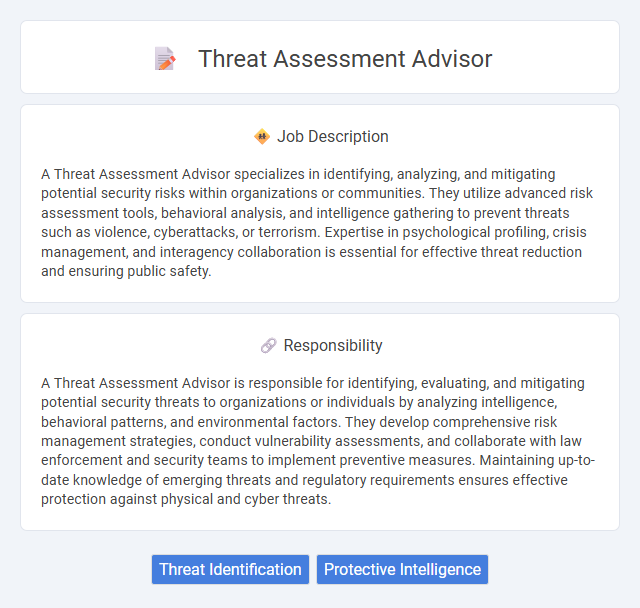
A Threat Assessment Advisor specializes in identifying, analyzing, and mitigating potential security risks within organizations or communities. They utilize advanced risk assessment tools, behavioral analysis, and intelligence gathering to prevent threats such as violence, cyberattacks, or terrorism. Expertise in psychological profiling, crisis management, and interagency collaboration is essential for effective threat reduction and ensuring public safety.
Individuals with strong analytical skills, keen observation, and emotional resilience are likely to be suitable for a Threat Assessment Advisor position. Those who can remain calm under pressure and demonstrate excellent communication abilities may excel in evaluating potential risks effectively. Candidates lacking attention to detail or the capacity to handle high-stress environments might find this role challenging.
Qualification
A Threat Assessment Advisor typically requires a strong background in security studies, criminal justice, or psychology, complemented by extensive experience in risk analysis and behavioral threat detection. Professional certifications such as Certified Threat Manager (CTM) or experience with law enforcement and intelligence agencies enhance qualifications. Proficiency in threat assessment methodologies, data analysis, and effective communication skills are essential for identifying and mitigating potential security risks.
Responsibility
A Threat Assessment Advisor is responsible for identifying, evaluating, and mitigating potential security threats to organizations or individuals by analyzing intelligence, behavioral patterns, and environmental factors. They develop comprehensive risk management strategies, conduct vulnerability assessments, and collaborate with law enforcement and security teams to implement preventive measures. Maintaining up-to-date knowledge of emerging threats and regulatory requirements ensures effective protection against physical and cyber threats.
Benefit
A Threat Assessment Advisor likely provides critical insights that help organizations anticipate and mitigate potential security risks, enhancing overall safety and operational continuity. This role probably contributes to reducing incident response times and minimizing damage from threats, which can protect both assets and personnel. Organizations employing Threat Assessment Advisors may experience improved risk management strategies, leading to greater confidence from stakeholders and regulatory bodies.
Challenge
Threat assessment advisor roles likely involve navigating complex and evolving security risks, requiring strong analytical skills to anticipate potential dangers effectively. The challenge may stem from the need to balance proactive measures with accurate threat identification while managing limited resources. High-pressure decision-making and staying updated on emerging threats could further complicate the advisor's responsibilities.
Career Advancement
A Threat Assessment Advisor plays a crucial role in identifying and mitigating potential security risks through detailed analysis and strategic planning. Career advancement typically involves progressing to senior security consultant, risk management director, or chief security officer roles by gaining expertise in threat intelligence, risk assessment methodologies, and cybersecurity frameworks. Enhancing skills in data analytics, crisis management, and interagency collaboration significantly boosts promotion prospects within government agencies, private sector firms, or consulting companies.
Key Terms
Threat Identification
Threat assessment advisors specialize in identifying potential security risks by analyzing behavioral patterns, environmental factors, and intelligence reports. They employ advanced analytical tools and techniques to detect early warning signs of threats in workplaces, schools, and public venues. Their expertise in threat identification informs proactive interventions that mitigate risks before they escalate into harmful incidents.
Protective Intelligence
Threat assessment advisors specializing in Protective Intelligence analyze and interpret data from multiple sources to identify potential security threats against individuals or organizations. They use behavioral analysis techniques, digital surveillance, and open-source intelligence to evaluate risks and develop preventive strategies. Mastery in threat detection, crisis management, and inter-agency collaboration is crucial for mitigating targeted violence and enhancing personal protection protocols.
 kuljobs.com
kuljobs.com